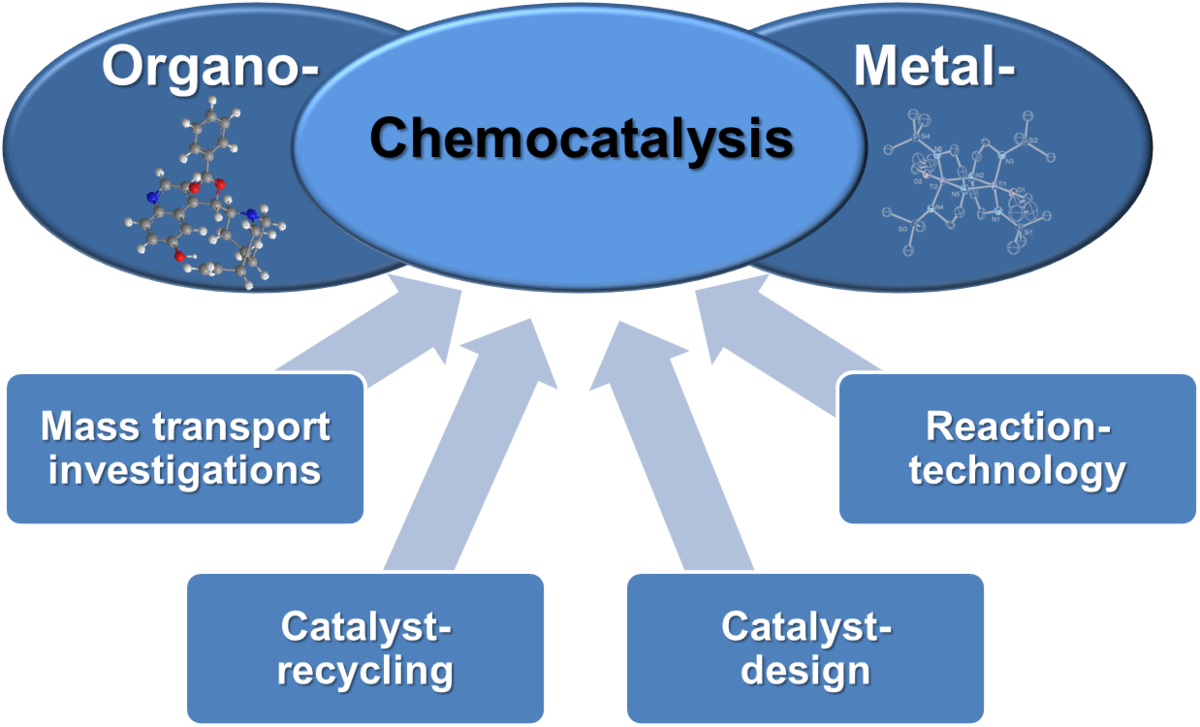- Großeheilmann, J.; Fahrenwaldt, T.; Kragl U., Organic Solvent Nanofiltration-Supported Purification of Organocatalysts. ChemCatChem 2016, 8, 322-325.
- Seidensticker, T.; Furst, M. R.; Frauenlob, R.; Vondran, J.; Paetzold, E.; Kragl, U.; Vorholt, A. J.
Palladium‐Catalyzed Aminocarbonylation of Aliphatic Alkenes with N, N‐Dimethylformamide as an In Situ Source of CO, ChemCatChem 2015, 7 (24), 4085-4090. - Vogl, C.; Paetzold, E.; Fischer, C.; Kragl, U., Highly selective hydroformylation of internal and terminal olefins to terminal aldehydes using a rhodium-BIPHEPHOS-catalyst system. J. Mol. Catal. A: Chem. 2005, 232 (1), 41-44.
- Dwars, T.; Haberland, J.; Grassert, I.; Oehme, G.; Kragl, U., Asymmetric hydrogenation in a membrane reactor: recycling of the chiral catalyst by using a retainable micellar system. J. Mol. Catal. A: Chem. 2001, 168 (1), 81-86.
In addition to enzyme catalysis, the exploration of new metal catalysts as well as organocatalysts is the focus of our research. The aim is the development of new chemical catalysts to produce new chemical products by a sustainable and resource-efficient route. Both heterogeneous and homogeneous catalysis are used. While heterogeneous catalyst can be recovered by simple processes such as fixed-bed anchors of the catalytic phase or filtration of the heterogeneous components, the separation of the homogeneous catalyst is clearly more difficult. The development of new and efficient methods for the gentle separation of catalysts are a major focus of our research. In addition to ultra- and nanofiltration, the effectiveness of multi-phase catalysis as well as novel immobilization methods as well as switchable solvent systems are currently under investigation. A significant disadvantage of traditional immobilization methods is often the loss of activity and catalyst leaching due to mass transport limitations. This is to be minimized by means of suitable mass transport assay methods, new reactor concepts, catalyst design and optimization of process parameters.
The search for alternative tin-free catalysts in collaboration with Henkel is a further important area of research in the field of sealants and adhesives, which mainly uses toxic tin-organo compounds. Another focus is the development of new polymerization catalysts and polymers for coatings, seals and adhesives.
In recent years, the interest of our working group has grown in the development of sustainable, efficient and reliable methods for obtaining enantiomerically pure compounds as precursors for pharmaceutical compounds. In addition to biotransformations, the use of suitable organocatalysts, e.g. quinine-based chiral catalysts is investigated. The optimization of the reaction of organocatalytic processes by the consideration of new reactor concepts while increasing the productivity of the organocatalyst are currently under investigation.

